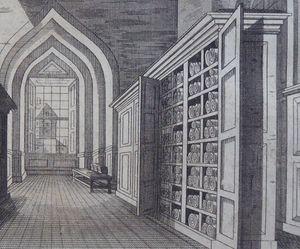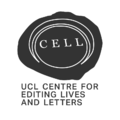Difference between revisions of "About"
m |
|||
| Line 15: | Line 15: | ||
<gallery> | <gallery> | ||
File:cell-logo.png|link=http://www.livesandletters.ac.uk/ | File:cell-logo.png|link=http://www.livesandletters.ac.uk/ | ||
| − | file: | + | file:BibSocLogo.jpg|link=http://www.bibsoc.org.uk/ |
file:Semantic-MediaWiki-logo.png|link=https://www.semantic-mediawiki.org/wiki/Semantic_MediaWiki | file:Semantic-MediaWiki-logo.png|link=https://www.semantic-mediawiki.org/wiki/Semantic_MediaWiki | ||
</gallery> | </gallery> | ||
Revision as of 04:55, 30 March 2023
Book Owners Online was initially authored by the book historian David Pearson, published by the UCL Centre for Editing Lives and Letters (CELL), and generously funded by the Bibliographical Society, the Marc Fitch Fund, and the Board of Electors to the James PR Lyell Readership in Bibliography at the University of Oxford's Bodleian Library.
BOO began life as a simple listing of seventeenth-century book owners posted online as a work in progress on the website of the Bibliographical Society, and on the "BibSite" of the Bibliographical Society of America. That list was always envisaged as a precursor to a fuller directory, with broader chronological range.
The list was a foundation for Pearson’s 2018 Lyell Lectures, published as Book ownership in Stuart England (Oxford University Press, 2021), where a version of it is included as the Appendix. As the purposes of the original online simple list are now superseded by BOO and by that book, the list on the Bibliographical Society site has been expanded to cover both the 16th and 17th centuries.
BOO has been developed as a digital publication using Semantic MediaWiki (details) by Dr Matthew Symonds and Clodagh Murphy of CELL. It aims to become established as a freely available online reference source, supported by the Bibliographical Society, and has deliberately been planned with the potential to expand both chronologically and geographically, and to enable the widening of the team of people who can directly input and edit data.
A recording of the Bibliographical Society's online symposium on BOO, held in February 2021 to present and explain the database and its rationale, is available online.
It will never be perfect; it will never be complete. Many entries have possibilities for expansion or refinement, based on more research with surviving books or documentary sources, and the addition of references. Databases like this are dynamic, easily edited, and intended to be continuously revised. It is hoped that the existence of BOO will prompt custodians to identify books with information or images which could usefully enhance it, and submit material which will improve it.



